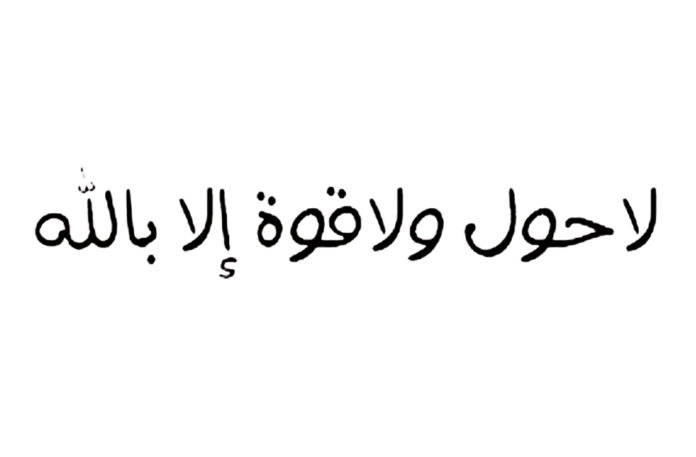The meaning of this phrase (there is no power and no strength except with Allah) is a person’s admission that he is unable to do anything without the help and support of Allah. No matter how great his power, energy and strength may become, a person still cannot do anything without the help of Allah Who is Above all of His creation, the Most Great, compared to Whom nothing else is great. Every strong person is weak when compared with Allah. Every great person is insignificant and weak when compared with His Might.
This sentence is uttered when some serious matter befalls a person that he cannot cope with, or there is something that it is very difficult for him to deal with.
Among the occasions on which this phrase is uttered are the following:
When turning over at night:
It was reported that Ubaadah ibn al-Saamit said:
The Messenger of Allah ﷺ said:
| Whoever turns over at night and says Laa ilaaha ill-Allah wahdahu laa shareeka lah, lahul-mulk wa lahul-hamd wa huwa ala kulli shayin qadeer. Al-hamdu-lillaah wa subhaan-Allah wa laa ilaaha ill-Allah wa Allahu akbar, wa laa hawla wa laa quwwata illa Billaah (There is no god but Allah Alone, with no partner or associate. To Him belongs praise and His is the sovereignty, and He is Able to do all things. Praise be to Allah, glory be to Allah, there is no god but Allah and Allah is Most Great. There is no power and no strength except with Allah), then he says, Allahumma aghfir li (O Allah, forgive me), or he makes duaa, his prayer will be granted. If he does wudoo and prays, his salaah will be accepted. (Narrated by al-Bukhaari, 1086) |
When the muezzin says Hayya alal-salaah (come to prayer) or Hayya alal-falaah (come to success)
It was narrated from Hafs ibn Aasim ibn Umar ibn al-Khattaab, from his father, that his grandfather Umar ibn al-Khattaab said:
The Messenger of Allah ﷺ said:
| When the muezzin says Allahu akbar, Allahu akbar (Allah is Most Great), and one of you says, Allahu akbar, Allahu akbar; then he says, Ashhadu an laa ilaaha illa Allah (I bear witness that there is no god except Allah and you say Ashhadu an laa ilaaha illa Allah; then he says, Ashhadu anna Muhammadan Rasool Allah(I bear witness that Muhammad is the Messenger of Allah and you say, Ashhadu anna Muhammadan Rasool Allah; then he says, Hayya alal-salaah (come to prayer) and you say, Laa hawla wa laa quwwata illa Billaah; then he says, Hayya alal-falaah (come to success) and you say, Laa hawla wa laa quwwata illa Billaah; then he says Allahu akbar, Allahu akbar, and you say, Allahu akbar, Allahu akbar; then he says Laa ilaaha illa Allah and you say, Laa ilaaha illa Allah if he says that from the heart, he will enter Paradise. (Narrated by Muslim in his Saheeh, 578, and by Abu Dawood in his Sunan, 443) |
When leaving one’s house
It was narrated that Anas ibn Maalik said:
The Messenger of Allah ﷺ said:
| Whoever says i.e., when he is leaving his house Bismillaah, tawwakaltu ala Allah, laa hawla wa laa quwwata illa Billaah (In the name of Allah, I put my trust in Allah, and there is no power and no strength except with Allah), it will be said to him, You are taken care of and protected, and the Shaytaan will leave him alone. (Narrated by al-Tirmidhi in his Sunan, 3348. Abu Eesa said, this is a hasan saheeh ghareeb hadeeth which we only know through this isnaad. See Saheeh al-Jaami by al-Albaani, 6419. It was also narrated by Abu Dawood in his Sunan (4431), where he adds: And another shaytaan says to him, What can you do with a man who has been guided, taken care of and protected?) |
After praying
It was narrated that Abul-Zubayr said:
| Ibn al-Zubayr used to say immediately after every prayer, when he had said the salaam, Laa ilaaha ill-Allah wahdahu laa shareeka lah, lahul-mulk wa lahul-hamd wa huwa ala kulli shayin qadeer. Laa hawla wa laa quwwata illa Billaah wa laa nabudu illaa iyyaah. Lahul-nimah wa lahul-fadl wa lahul-thanaa al-hasan. Laa ilaaha ill-Allah mukhliseena lahul-deena wa law karihal-kaafiroon (There is no god but Allah Alone, with no partner or associate His is the sovereignty and to Him be praise, and He is Able to do all things. There is no power and no strength except with Allah, and we worship none but Him. From Him (alone) come all blessings and favours, and all good praise is due to Him. There is no god but Allah and we make our worship purely for Him (alone) however much the disbelievers may hate that). He said: The Messenger of Allah (peace and blessings of Allah be upon him) used to say these words immediately after every prayer. (Narrated by Muslim in his Saheeh, 935) |
Footnote
Islamqa.info.en
(NOTE: If you want to build a strong and powerful relationship with Allah, check out Islamia TV, where you can watch Islamic speakers from across the globe deliver inspiring and motivational courses. Learn more at www.islamia.tv.)





















